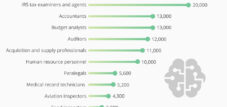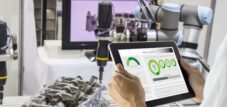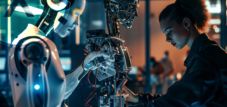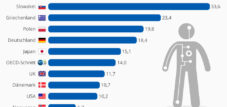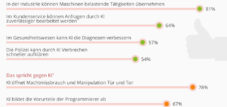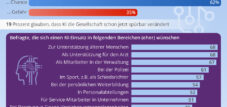Entry level jobs and software developers: artificial intelligence and the effects on the labor market
Xpert pre-release
Language selection 📢
Published on: May 26, 2025 / update from: May 26, 2025 - Author: Konrad Wolfenstein

Entry level jobs and software developers: Artificial intelligence and the effects on the labor market-Image: Xpert.digital
The future of work: why education has to be rethought
Artificial intelligence and the transformation of the labor market: Entry level jobs and software development in change
The rapid development of artificial intelligence leads to a fundamental redesign of the labor market, whereby Entry-level positions and software development roles are particularly affected by disruptive changes. Current studies show that around 2030 in Germany, around 3 million jobs will be severely affected by AI changes, while new professional fields arise. The transformation is not even: While traditional entry positions are increasingly automated, new, highly qualified roles that require AI expertise are created. For companies such as Amazon, software developers report fundamentally changed work processes in which AI assistants already generate 30 percent of the code and drastically increase the work speed. This development raises fundamental questions about the future of traditional career paths and requires a comprehensive reassessment of educational and qualification strategies.
Suitable for:
- Job killer or joker? The truth about automation, AI and robotics - from the assembly line to the “memorial strap”?
The disruption of the Entry Level jobs
Threat of traditional entry positions
The effects of artificial intelligence on Entry level jobs are already clearly manifested in various economic sectors. Anesh Raman, Chief Economic Opportunity Officer at LinkedIn, warns of a fundamental disorder of the traditional career ladder, since AI is increasingly at risk of the types of positions, which historically served as an entry point for young specialists. This development is particularly worrying because it affects the “lowest shoots of the career ladder” and thus interrupts the traditional path to a professional career.
Huy Nguyen, Chief Education and Career Development Advisor at “Intelligent”, explains that entry roles in particular are at risk, as these can be replaced by AI. Many university graduates are typically set for positions that include information -related tasks such as research, data acquisition, customer support and general office assistance. These activities are essential for young professionals to gain practical experience, but at the same time to automate the easiest way to automate through AI systems.
The situation is intensified by the decline in available internships. Of the companies surveyed, 86 percent stated that despite the technological developments, five percent of the companies have already stopped filling internships because AI has already taken on the tasks of the intern. This development is particularly problematic because internships traditionally act as an important bridge between university formation and starting your career.
Effects on generation z
Generation Z is at the center of this disruption because it is currently entering the labor market or is about to. In a recent survey by Handshake, 62 percent of students in the last academic year, who are familiar with AI tools, expressed concerns about the effects of these technologies on their job prospects-a significant increase in 44 percent in 2023. Computer science students are particularly pessimistic: 28 percent describe themselves as “very pessimistic” regarding their career prospects in the current economic situation compared to the previous year.
Handshake's data illustrates the challenges: by March 2024, prospective graduates reached 21 percent more applications than in the previous year, while the job advertisements on the platform decreased by 15 percent. This discrepancy between supply and demand increases the competitive pressure and makes start -ups increasingly more difficult for young people.
Software development through change: the Amazon example
Changed work processes in tech giants
Amazon serves as a paradigmatic example of the transformation of software development by AI. The company has strongly urged its development teams to integrate AI into their work processes, increasing the output goals and reducing the tolerance for delays. An Amazon engineer reported that his team is about half as large as in the previous year, but should still deliver the same code volume by using AI tools.
In his recent announcement to shareholders, CEO Andy Jassy emphasized that generative AI brings significant advantages for companies in terms of productivity and cost savings. He emphasized the need to work faster because competitors could gain an advantage if Amazon is unable to fulfill customer requirements “as soon as possible”, whereby he specially called the coding as a area in which AI would “change the standards”.
The speed of the development cycles has changed dramatically. An engineer noticed that the development of a new website feature used to last several weeks, but now often has to be completed within a few days. This acceleration is made possible by AI supported coding and reducing meetings for feedback and brainstorming.
From development to monitoring
A fundamental change is shown in the changed role of the software developers: from active programmers to monitor and examiners of AI-generated code. Many Amazon engineers use AI assistants who propose code lines, and the company recently introduced AI tools that can generate large parts of the code autonomously. An engineer described these tools as “terrifyingly good”, but many developers hesitate to take over these new tools, as they require extensive checks and prefer to keep them more control over their work.
Simon Willison, a AI enthusiast and experienced programmer, comments: “It is more fun to write code than checking it. A code review is rarely the most pleasant part of the job. When using these tools, it becomes the majority of the workload”. This postponement of development for review makes engineers feel like mere viewers in their own roles.
Matt Garman, CEO of Amazon Web Services, forecast this development in an internal conversation and predicted that most developers may no longer program in 24 months. This prediction indicates a fundamental reefination of the role of software developers, which have to focus more on customer requirements and strategic considerations.
Suitable for:
- Artificial intelligence shock for India: India's economic miracle in danger? AI threatens millions of jobs
Global perspectives: India as a case study
Threat of the demographic dividend
India offers a particularly impressive example of the disruptive effects of AI on national growth strategies. The US investment bank Bernstein warns in a dark report that "the advance of AI threatens to destroy all the advantages of India's demographic dividend". Around 500 million Indians aged five to 24 years are to enter the labor market over the next 20 years.
The traditional assumption of “more young people = more jobs = more growth” is no longer threatening to work, since artificial intelligence can do many of these jobs faster, cheaper and more precisely than humans. The Indian service sector-IT outsourcing, business process management and knowledge work-is particularly affected-where over ten million people work, many of which are among the lowest income.
The amber report explicitly warns: "AI subscriptions that only cause a fraction of the costs of Indian professionals can do their tasks with higher precision and speed". The problem is tightened by the fact that the switch to AI requires little investments - very different from automation in industry.
Structural challenges in the IT sector
The transformation is already shown in India's IT Hiring practices. In the 2024 financial year, IT companies hired between 60,000 and 70,000 beginners-the lowest setting rate in two decades. Since AI automated routine tasks such as programming and testing, companies prioritize increasingly qualified specialists at the middle level, especially in the areas of AI and machine learning.
A particularly bitter aspect is the innovation paradox: India has globally one of the highest rates of AI competencies among specialists and thousands of AI startups, but hardly relevant patents. India only registers 0.2 percent of all worldwide AI patents-compared to 61 percent from China and 21 percent from the United States. This discrepancy between talent and innovation illustrates the structural challenges in the transformation of traditional business models.
🎯🎯🎯 Benefit from Xpert.Digital's extensive, fivefold expertise in a comprehensive service package | R&D, XR, PR & SEM

AI & XR 3D Rendering Machine: Fivefold expertise from Xpert.Digital in a comprehensive service package, R&D XR, PR & SEM - Image: Xpert.Digital
Xpert.Digital has in-depth knowledge of various industries. This allows us to develop tailor-made strategies that are tailored precisely to the requirements and challenges of your specific market segment. By continually analyzing market trends and following industry developments, we can act with foresight and offer innovative solutions. Through the combination of experience and knowledge, we generate added value and give our customers a decisive competitive advantage.
More about it here:
Labor market of the future: AI revolutionizes office, service and software areas
Cross -sector transformation
Administration and office activities
The McKinsey study identifies administrative areas as particularly affected by AI changes. More than every second job change (54 percent) caused by AI in Germany falls into the area of office jobs in administrations of companies and public institutions. In addition to Italy, Germany is particularly affected because office work is a high proportion of overall employment.
The Institute for Labor Market and Vocational Research (IAB) determined that in 2022, 38 percent of the social security employees worked in professions in which at least 70 percent of the activities could potentially be done by AI. A surprising knowledge of the study is that AI is most likely to take on highly qualified employees. This finding is in contrast to previous scientific knowledge, which assumed that AI would rather replace activities of employees with low or medium qualifications.
Call center and customer service
A differentiated development is shown in the call center area. According to its own statements, the industry employs more than half a million people. While simple telephone inquiries can already be answered by chatbots, experts like Michael Egelseer from the Federal Association of Digital Business see a limited role for AI: "KI can only take on simple tasks".
At Leipziger TAS AG, KI works as an assistant for customer advisors. For example, while a customer reports a household shop, the bot is already looking for the corresponding insurance policy and shows whether the stolen bike is also insured. However, Kai Zugold, the company's technology manager, emphasizes that the AI serves as support for human employees, not as a replacement.
Telecommunications: Balance between man and machine
Deutsche Telekom pursues a “human-centered” approach in AI integration. Claudia Nemat emphasizes that AI-based technologies use people and should not harm him. The company deliberately continues to relate to human workers and, for example, have teams in service that specialize in helping older people by phone with technical questions.
Telekom uses AI for both customers and for employees. A AI-based chatbot can answer non-standard questions, such as roaming costs in different countries. There is an “Employee Concier” bot for employees that helps fiber optic planners without having to search 9000 pages of PDF documentation. These applications show how AI can increase efficiency without completely replacing human workers.
Suitable for:
- The rise and case of prompt engineering: How a promising AI profession became obsolete within a very short time
New professional fields and qualification requirements
Development of AI-specific roles
Despite the disruption of traditional jobs, new, lucrative professional fields around artificial intelligence are created. By 2035, around 1.3 million jobs in Germany have been changed or replaced by automation and AI-based technologies, but at the same time new jobs and job profiles such as AI managers and AI consultants are being created.
The demand for qualified AI experts increases sharply and leads to a bottleneck on the job market. According to Stepstone, demand has already increased by around 50 percent between 2019 and 2023. Companies write out significantly more jobs for AI jobs, and AI experts can look forward to above-average salaries. According to Stepstone, data scientists earn 67,000 euros per year in the median, with professional experience, annual salaries of 90,000 euros and more are possible.
Five key roles have established themselves as particularly in demand: AI specialists who develop AI models for real applications; Machine Learning Engineers who specialize in technical implementation; Data Scientists for data analysis and interpretation; AI ethics expert for responsible AI development; And promptly engineers who focus on optimizing communication with AI systems.
Change in qualification requirements
A study carried out by Deloitte shows that the majority of companies assume that generative AI will influence their talent strategies within two years. The focus is on adapting work processes and retraining of employees. Generative AI will increase the value of certain technical and interpersonal skills, while other skills lose importance.
According to McKinsey, the demand for technical skills will increase strongly, in Europe alone by 25 percent. But social and emotional skills are also asked more (+12 percent). This development indicates that future workers will need both technical AI knowledge and increased human skills.
Completely new skills and job profiles will be required in a work world shaped by AI. Instead of traditional professions such as graphic artists or copywriters, the demand for employees who can effectively “communicate” with AI will increase. At the same time, new challenges such as the critical questioning of concepts generated by AI are created and the development and implementation of AI strategies.
Suitable for:
- Jobs with a future? The success of a robotics project also depends on the collaboration between robotics and artificial intelligence (AI) specialists
Expert assessments on the future of work
Optimistic perspectives
Andrew NG, founder of Google Brain and professor at Stanford University, represents an optimistic view of the AI-related change on the labor market. He does not believe that AI will replace workplaces completely and argue: “If 20 to 30 percent of the workplaces are automated, this means that the job will continue to exist. It also means that AI will not replace people, but maybe people who use AI will replace people who do not do so”.
NG is confident that automation will only help companies find new opportunities for innovations. If companies find out that they can do a task with the help of AI 1,000 times cheaper, they will probably invest in a 10,000-fold execution of this task. "What I saw is that it is nice to save money, but there is only as much money as you can save. But growth has no limit, no upper limit," he explains.
Mark Quinn, who lost his job due to AI, still shares an optimistic assessment. Quinn worked for a startup company for generative artificial intelligence and led a team to monitor bot answers. When the AI improved, the company found that it could do with a smaller, more efficient group. Although Quinn lost his job, he does not believe that this was a sign of an upcoming job death through bots.
Warning voices
Gary Hamel, visiting professor at the London Business School, is skeptical about the predictability of the AI effects: "Part of it is that we really don't know". The lack of a solid consensus among experts from the technology and working world about the effects of the AI shows how many questions are still open.
Demis Hassabis, CEO of Google Deepmind, warns of significant changes in the next five to ten years. He encourages teenagers to deal intensively with artificial intelligence and describes them as the defining technological power of their time. "Over the next 5 to 10 years I think we will find what usually happens in large new technology bumps: some jobs are being disturbed. But new, more valuable, mostly more interesting jobs will be created".
The Institute for Public Policy Research (IPPR) draws a dark picture in a worst-case scenario: Around eight million people could lose their jobs through AI in Great Britain. The researchers speak of a “job apocalypse” if this scenario occurs. AI would therefore make women, younger workers and low -wages unemployed in particular, since their jobs are most affected by AI by AI.
Time frame and speed of the changes
The experts largely agree that the changes have already started and will accelerate in the next few years. Lawrence Katz, working economy at Harvard University, describes the current developments as a “acceleration for knowledge workers” and compares it to the changeover of craftsmanship into factories in the 19th and 20th centuries.
The International Monetary Fund already warned in January that AI affects 60 percent of all jobs in the United States and could tighten assets. Mustafa Suleyman, CEO of Microsoft's internal AI department, predicted that the technology would create a large number of “very dissatisfied” office workers that are pushed out of their professions. "Many of the tasks in the office area will undoubtedly look very different in the next five to ten years," said Suleyman.
Workplace shifts by AI: What companies and countries have to learn
The analysis of the current developments shows that artificial intelligence is already changing fundamentally, how work is organized and carried out, whereby Entry-level jobs and software development are particularly affected. Disruption is not as a singular event, but as a continuous transformation process, which influences different industries and qualification levels in different ways. While traditional entry positions are increasingly automated and thus interrupt the classic career path, new, highly qualified roles that require AI expertise are created.
The challenges for Generation Z are particularly serious because they enter a job market in which traditional learning paths and internship opportunities are disappearing. The Amazon example illustrates how self-qualified areas such as the software development from creative, problem-solving activities to monitor and testing roles develop. This shift raises fundamental questions about professional identity and satisfaction.
At the same time, countries such as India show that entire national growth strategies can be endangered by AI discharge, especially if they are based on the provision of workers for automatable activities today. The emerging new professional fields require a fundamental realignment of educational and qualification systems, with both technical AI skills and increased human abilities such as creativity and emotional intelligence.
The forecasts of the experts range from optimistic growth scenarios to warnings of massive job losses, which illustrates the uncertainty and complexity of the upcoming transformation. It will be crucial whether it will be possible to accompany the disruption through proactive education, qualification and social policy and to ensure that the advantages of the AI revolution are broadly distributed instead of exacerbating existing inequalities. The next five years will be considered a critical period in which the course is set for the future of work.
We are there for you - advice - planning - implementation - project management
☑️ SME support in strategy, consulting, planning and implementation
☑️ Creation or realignment of the digital strategy and digitalization
☑️ Expansion and optimization of international sales processes
☑️ Global & Digital B2B trading platforms
☑️ Pioneer Business Development
I would be happy to serve as your personal advisor.
You can contact me by filling out the contact form below or simply call me on +49 89 89 674 804 (Munich) .
I'm looking forward to our joint project.
Xpert.Digital - Konrad Wolfenstein
Xpert.Digital is a hub for industry with a focus on digitalization, mechanical engineering, logistics/intralogistics and photovoltaics.
With our 360° business development solution, we support well-known companies from new business to after sales.
Market intelligence, smarketing, marketing automation, content development, PR, mail campaigns, personalized social media and lead nurturing are part of our digital tools.
You can find out more at: www.xpert.digital - www.xpert.solar - www.xpert.plus












